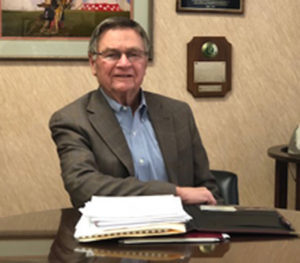
Editor’s Note: Bank directors need to be the kind of people who not only know their banks, but also have an eye for the trends and opportunities that will help their banks stay relevant and grow while balancing risk. It’s a tough job, and this year’s five Amazing Outside Directors have demonstrated their ability to rise to that challenge. This is one of five profiles to be posted on BankBeat. We recognize and thank our Amazing Outside Directors program sponsor Eide Bailly for its support.
Rod Fouberg never intended to get involved in banking. He got his degree in animal science from South Dakota State University, Brookings, and headed to the Sioux City stockyards. Fouberg then worked as a county extension agent for five years before Dacotah Bank approached him about becoming an agricultural lender in 1967.
“At that time, a lot of banks were looking for ag loan officers and paid attention to the ag background as much as they did the banking background,” Fouberg said. “In my case, I had an ag background and an ag education, and they thought they could make a banker out of me.”
Based in Aberdeen, S.D., Dacotah did indeed make a banker out of the Mitchell, S.D., native. Only 140 miles north of his birthplace, Fouberg spent the next 40-plus years working at Dacotah. In 2008, he took a step back from CEO duties and fully retired three years ago. Fouberg, 79, remains a director at the $2.4 billion Dacotah Bank.
BankBeat is honoring Fouberg as an Amazing Outside Director for 2018, along with four other directors.
For the first two decades of Fouberg’s time learning the ag lending business, life was good, perhaps even easy. In 1984, he became chairman and CEO of Dacotah Banks, Inc., the multi-bank holding company overseeing the different banks that eventually consolidated to become Dacotah Bank, at the time which consisted of 13 bank locations and $225 million in assets.
Then came the ag crisis of the mid-1980s. Dacotah Bank held on tight, relying on the exact agricultural background it had once sought out in its lenders and its CEO.
“One of the things that we talk about around here a lot is we had a lot of ag experience in our lending folks,” Fouberg said. “We probably took some risk, but it really paid off for us in the long run. We developed a lot of loyal customers during those difficult years. We’re still doing business now, not with that generation anymore, but with the next one or two.”
Those decades-long relationships are again facing tough times amid the current downturn in the agricultural cycle. Fouberg maintaining a presence in the bank, including a physical office, makes it easy to remember the lessons learned 30 years ago. If need be, he simply reminds his son, Robert, currently the bank’s executive vice president.
“We learned patience is important and working with borrowers is very important,” Fouberg said. “It’s different now — it’s tight with low commodity prices, but for the most part, balance sheets are in good shape and there is staying power out there, if you will stay as well.”
Keeping an office in the bank also allows Fouberg to stay tuned-in to the community, and bring that information back to the bank’s board as necessary. As CEO, he always advocated for employees to get involved in their communities in any way that would promote economic development.
Fouberg practiced what he preached to the point that he was not only inducted into the South Dakota Hall of Fame, but he also received the 2017 Governor’s Excellence in Economic Development Award from Gov. Dennis Daugaard. To Fouberg, the motivation was simple.
“I’m a South Dakotan, no doubt,” he said. “I, along with our company, have always been interested and active in and around economic development or any organization that would promote our state and its people.”
That continues even as a director. When Fouberg sees a local need, he knows where to bring it up. Then, if appropriate, the bank gets involved.
“I’ve got the background in banking, but one of the reasons I maintain an office is there’s certainly plenty to do.”
